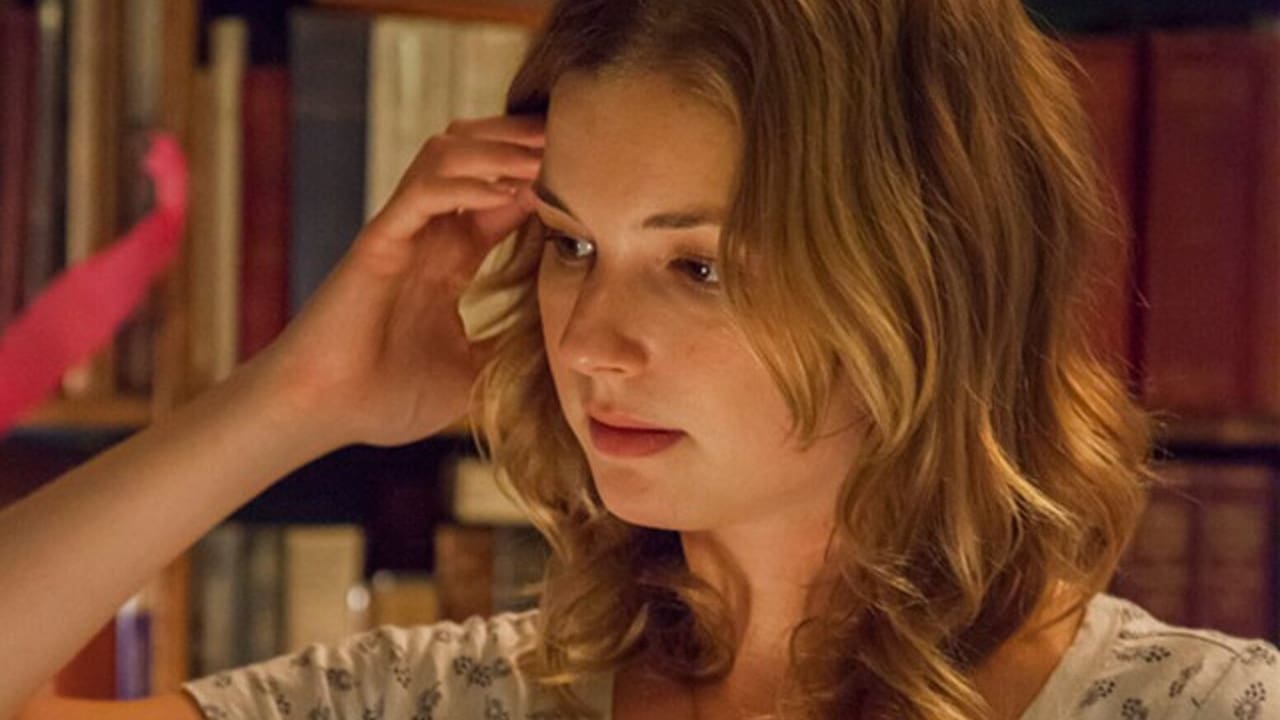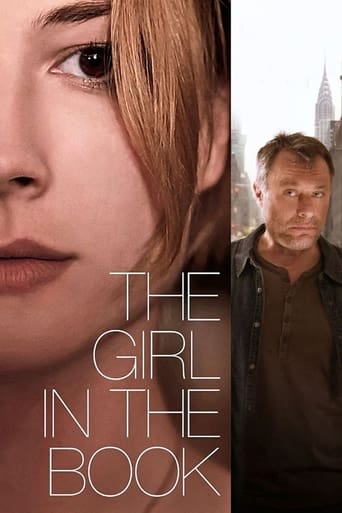IslandGuru
Who payed the critics
AniInterview
Sorry, this movie sucks
Connianatu
How wonderful it is to see this fine actress carry a film and carry it so beautifully.
Stephanie
There is, somehow, an interesting story here, as well as some good acting. There are also some good scenes
TheLittleSongbird
Any film that covers the subject of rape/sexual abuse and its mental and emotional repercussions deserves to be applauded. It is a very difficult and sensitive subject that is also surprisingly complex when you see it from the victims' point of view.'The Girl in the Book' is not the first film to explore the subject of rape/sexual abuse, and there are better overall examples when it comes to recent examples of films covering the subject it fares favourably. The last film seen by me exploring the same subject was 'Return to Sender' from two years ago, despite my admiration for Rosamund Pike (a good performance in a mediocre at best film) 'The Girl in the Book' is the much better film, being much better written, acted and easier to swallow on the most part. Again on the most part, 'The Girl in the Book' is a good film and a brave and well done exploration of a difficult subject that is harrowing and sensitive and not easy to talk about. It is also often misunderstood, with generalising, misconceptions and even with victim-blaming, which is good reason as to why it could be addressed more.The first 10-15 minutes are on the erratically paced side and the two stories/time-line structure from the past with younger Alice and the present with older Alice is initially a little confusing and not as easy to follow as it could be. A longer length would definitely have helped, the film is too short which did make it occasionally jumpy and rushed.If one feels the same and is considering switching it off, stick with it. The structure becomes clearer and while doing it in a nuanced way the film really comes to life. Sadly, 'The Girl in the Book' does fall apart in the final act, or the last half an hour, where it is too reliant on coincidences delivered in a very clunky fashion, things are wrapped up too tidily and conveniently and it just feels illogical and although intended to be inspiring the outcome felt forced and tacked on, hardly applying to a lot of victims and even when there are victims that do move on to some extent they never forget it.On the other hand, 'The Girl in the Book' has a lot to recommend it. It is photographed with a lot of fluidity and atmosphere and the editing is always crisp and cohesive. The music, when used, never overbears the drama but is never too low key either. Marya Cohn makes a remarkably auspicious directorial debut, pacing enough of the story beautifully and being alert and accommodating to the actors, allowing them to bring believability and nuanced layers to otherwise fairly clichéd roles (particularly striking in this case is Alice, both older and younger).'The Girl in the Book's' script is deft and can be surprisingly rich, clunking only in the final 30 minutes. Much of the story is clear, appropriately paced (though it is less than perfect in this regard) and dealing with its subject in a way that's harrowing, intelligent and poignant (there is little trivialising or sugar-coating here), making one really relate to Alice. A lot of the numerous twists are unexpected, logical and hit hard, if one feels uncomfortable watching that isn't a bad thing.Every bit as impressive, in fact even more so, is the acting, with a particularly exceptional (haven't used that word often recently but in this case it is more than well deserved) performance from Emily VanCamp, bringing so many layers from guilt, shame and tormented pain but also determination and conscientiousness with defiant commitment and touching nuances to a character she makes complex and easy to relate to, yes even to people who have not been through rape/sexual abuse themselves. Ana Mulvoy-Ten portrays the younger Alice every bit as believably, going through a wide range of emotions hit perfectly.Similarly, 'The Girl in the Book' boasts a (relatively) atypically chilling Michael Nykvist (best known to me as the male lead in the Swedish 'The Girl with the Dragon Tattoo' trilogy) who does a fabulous job making his character as loathsome as can possibly be, his death from lung cancer earlier this year was and still is a very sad loss. David Call brings a sympathetic charm and makes the most of what is essentially a plot device character. Michael Cristofer plays a dismissive and cold father figure wonderfully, making one hate him just as much as Nykvist's Milan. Ali Ahn is fine too and one can easily identify with her having her heart in the right place and being the voice of reason.Overall, doesn't completely engage at first and let down badly by the final act, but if stuck with it's very well done and absorbing. 7/10 Bethany Cox
Vonia
A hidden gem of a film. I have no idea why they did not address then entire theme of the film in any synopsis I read, anywhere. Especially since it was revealed within the first several minutes. What is it? The unfortunately seldom addressed, yet perennially relevant trauma that is sexual abuse. Specifically, by an older father figure upon a naive young girl. The situations where charged are never pressed, but the repercussions can be devastating and lifelong, in ways that might not be obvious to the unsuspecting eye. The more the general public is educated, the more likely we are to understand and recognize the problem. I will not say that much more because this is the type of film one must view to truly appreciate; words will not suffice. It is is the casting decisions, the resulting chemistry between the characters, the subtle nuances of the acting, the things that are not said, and the in between silences that really make the difference. All around impressive performances. Emily VanCamp as 29 year old Alice, forced to revisit her traumatic past with the man who raped her, then proceeded to use her words and her entire life as the protagonist for a best selling book. As Milan, the older man who manipulates, sexually abuses, uses, and rapes her, Michael Nyqvist manages to make his character almost vindicable at times, other times someone viewers would want killed. Michael Cristofer as the dominating father that neglects his daughter, obviously calling out for attention. My personal favorite, Ali Ahn as the Asian girl that is Ana's best friend and always straightforward voice of reason. Why? Because she reminds me of me, of course. Ethnicity aside, the secret to her heart is good food (I love the scene where she tells Ana she does not want to see her for a while but takes the dulche de leche from her hands before closing the door on her) and she tells it as it is, blunt to a fault. Mason Yam as the adorable soon that Alice is a godmother to. David Call as the cute boyfriend that opens Alice's eyes. Last but certainly not least, the most unexpectedly commendable performance by Ana Mulvoy Ten, playing young Alice. **** Spoilers **** My only complaint is that it did make it seem a little too easy for Alice to work through her trauma. Based on my time in the world of Social Work and bring a Psychology scholar, I can assure you most cases of sexual abuse, with the victim more than a decade later, will not "heal" as suddenly as this film seemed to portray. It felt like a forced positive ending, since that is what most audiences want. Oh, and that "100 Reasons You Should Forgive Me" idea? Romantic. Touching. Ingenious. Awesome.
Kirpianuscus
a delicate theme. a meeting. a decent film. and the grace to explore the nuances of a painful memory. the option to explore the consequences of a childhood's incident, the need to escape from the mark of indifference of parents is an inspired option for define Alice's dramatic status. because Emily VanCamp does a great job in the lead role. because her fight to be herself against the past is credible , maybe as sketch but enough for suggest the drama. it is a good film. against the temptation to criticize it for the absence of a profound analysis of case. the last scene, like the scene of confrontation, are the two moments who saves the not great courage of director to search the roots of drama. so, see it !
Leopardman4
The central character here is clearly a victim, and yet, by the middle of the pic, she is turned into a latter-day Hester Prynne -- without the overt tribal ritual of the Scarlet Letter.She is pilloried for bedding -- or for appearing to bed -- a teenage babysitter at the house of her best friend. Really? I mean, hey, c'mon, like, who hasn't done that? Okay, I'm kidding, maybe it's been months or even years since you've done that, but the point is, this is the place in this moralistic tripe where she becomes some kind of sexual villain?! Don't bother telling that babysitter kid because he's already on the blower telling his entire school how he and a twenty-something done done the deed.And that sad excuse for a boyfriend, the social activist savior? People with good intentions will stand by and weep while you burn at the stake. And why? Because, they will say, "She brought it on herself." And then the weasel will run for public office over your dead body.Who are we talking to here? YOU. You if, when she finally went to confront her seducer, you weren't hollering at the screen, "Kick him in the nuts, honey!"And then hollering, "TWICE!"(If you're a guy, and you can look at Emily VanCamp's face without seeing that she's the victim, then you have earned all your credits to graduate from Gay University...) :-)

